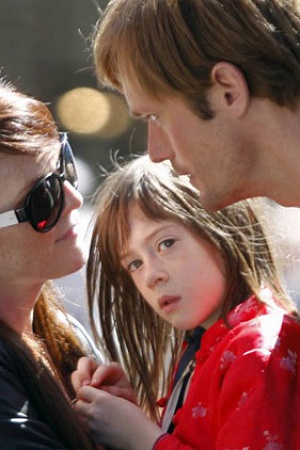The Insult ★★★
‘No one has a monopoly on suffering,’ says Wajdi Wehbe (Camille Salamé), the barrister representing Lebanese Christian mechanic Toni Hanna (Adel Karam) in his law suit against Palestinian Muslim refugee Yasser Abdallah Salameh (Kamel El Basha). Wehbe’s statement is intended to address what he perceives as an imbalance in the level of sympathy and support offered to the (minority) Lebanese Christian community. To what degree suffering can excuse, not just explain, retaliatory violence lies at the heart of The Insult.
Toni is a very angry man – later we find out why – and hates the influx of Palestinian workers in his Beirut neighbourhood. His pregnant wife, Rita Hayek (Shirine Hanna), urges him to move back to their hometown Damour. They are rebuilding there, she says; they would have more room for the baby. But he summarily dismisses her idea. It helps to know that in 1976 during the Lebanese civil war, Damour’s Maronite Christian community was attacked and massacred by left-wing Muslim militants aided by the Palestinian Liberation Organisation (PLO).
At home and in the auto shop, Toni constantly has the radio or television tuned to Christian Party supporters spouting nationalist rhetoric not dissimilar to that of Pauline Hanson’s One Nation. It is clear that Toni’s antipathies are deeply rooted in the complex religious and historic divisions of the Middle East.
Yasser is an engineer, a proud and ethical man reduced to acting as foreman of a repair crew made up of refugees like himself. When water cascades from Toni’s improperly installed drainpipe, Yasser demands its replacement. Toni’s defiant reactions seem disproportionate. When Yasser confronts him, Toni speaks the fateful, provocative words – ‘I wish Ariel Sharon had wiped you all out’ – and Yasser retaliates. An apology is sought but not forthcoming. Violence escalates.
It is also important to note that the Damour massacre happened as a reprisal for the Karantina massacre earlier in 1976, when the predominantly Palestinian Muslim slum area of Beirut was overrun by the right-wing, predominantly Christian Lebanese Front. Over 1,500 people, mainly Muslims, died in that massacre. One reprisal follows another, seemingly without end, and hostilities linger long after the war is officially over. This is the other message of The Insult and its writer/director Ziad Doueiri.
Continue reading for only $10 per month. Subscribe and gain full access to Australian Book Review. Already a subscriber? Sign in. If you need assistance, feel free to contact us.















Leave a comment
If you are an ABR subscriber, you will need to sign in to post a comment.
If you have forgotten your sign in details, or if you receive an error message when trying to submit your comment, please email your comment (and the name of the article to which it relates) to ABR Comments. We will review your comment and, subject to approval, we will post it under your name.
Please note that all comments must be approved by ABR and comply with our Terms & Conditions.